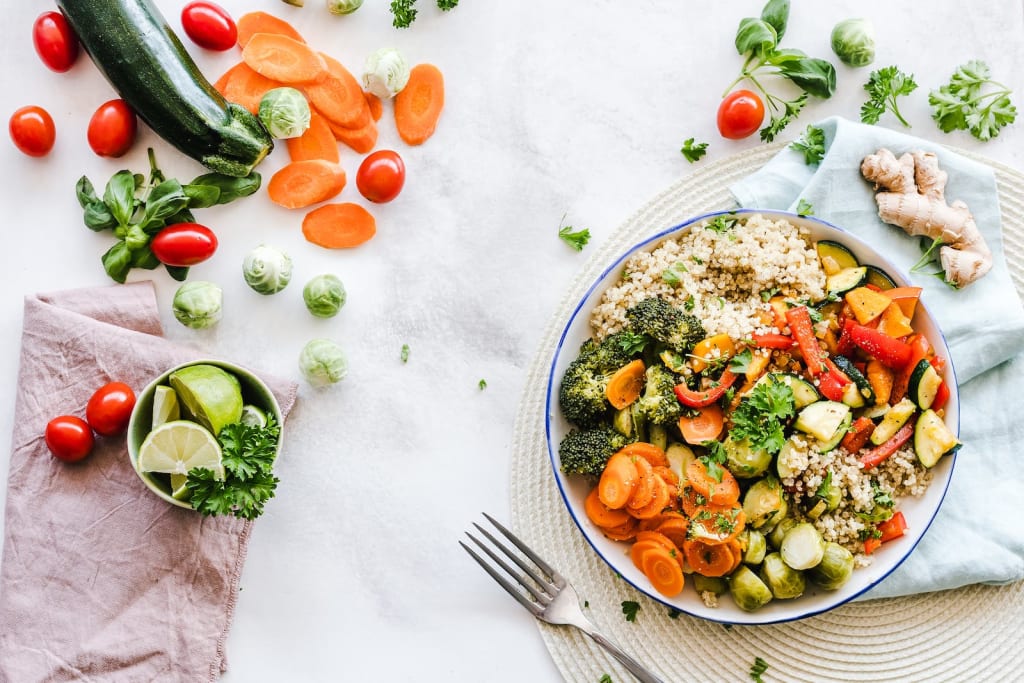When It Comes to Fat Loss, Your Diet Matters!!
Setting Your Diet Up for Successful Fat Loss

I. Introduction
• Importance of diet in fat loss
• Overwhelming options and difficulty in choosing the right approach
II. All Diets Work the Same Way
• Achieving fat loss through caloric deficit
• Psychological and physiological benefits of different diets
III. The Best Diet for Fat Loss
• Choosing the diet you enjoy and can be consistent with
• Factors to consider for optimizing fat loss
IV. Calorie Intake for Fat Loss
• Moderate caloric deficit for maximum fat loss
• Recommended starting point for calorie intake
V. Importance of Protein
• Role of protein in maintaining muscle during a caloric deficit
• Recommended protein intake for muscle growth and maintenance
VI. Adjusting Carbs and Fats
• Debate between low-fat and low-carb diets
• Recommended fat intake and adjustment based on preferences
VII. Setting Up and Optimizing Your Diet
• Caloric intake, protein, carbs, and fats
• Finding the right balance for fat loss
VIII. A Typical Day of Eating for Fat Loss
• Breakfast: Smoothie, fruits, and rice cakes
• Post-workout meal: Sweet potato, chicken, and salad
• Snacks: Fruits, vegetables, black coffee, and green tea
• Lunch: Sushi for a low-calorie, high-protein choice
• Dinner: Eggs, toast, peanut butter, and salad
• Addressing concerns about eating late at night
IX. Tracking Calorie Dense Foods
• Importance of measuring or weighing calorie-dense foods
• Preventing underreporting and hindering fat loss progress
X. Conclusion
• Importance of incorporating enjoyable foods in your diet
• Optimizing fat loss through personalized strategies
"When It Comes to Fat Loss, Your Diet Matters"
When it comes to fat loss, there's no doubt that your diet is the most important factor that you have to get right. Even if your training is on point and consistent, you're simply not going to see the results you want without a proper nutrition strategy. But this is where most people fail, and I honestly don't blame them. We're constantly overwhelmed with new diets that are supposedly the new best way to lose fat. So, it becomes extremely difficult to know which approach to take. But the real truth is that every single diet or dieting method out there works the exact same way. They all achieve fat loss by causing you to eat at a caloric deficit, meaning that you're eating fewer calories than you're burning every day. Research has proven time and time again that whether it's keto, intermittent fasting, and so on, although these diets may each have certain psychological and physiological benefits, none of these diets or methods have any special fat loss effect. They instead work by making it easier for you to eat fewer calories, simply meaning that the best diet for fat loss is really the one that you personally enjoy the most and will be most consistent with. However, with that being said, regardless of what approach you choose, there are a few factors that you need to get right in order to optimize your diet for fat loss, mainly how many total calories, protein, carbs, and fats you're consuming on a daily basis.
As for your calorie intake, if you want to maximize fat loss while minimizing muscle loss, then you have to pay close attention to how many calories you're intaking. Research indicates that this is best done with a moderate caloric deficit that enables you to lose around 0.7 percent of your body weight per week, which is around 1 pound of weight loss per week for most people. In fact, a more aggressive calorie deficit was actually shown to hinder fat loss as opposed to accelerating it. If you're unaware of
Setting Your Diet Up for Successful Fat Loss
When it comes to fat loss, there's no doubt that your diet is the most important factor that you have to get right. Even if your training is on point and consistent, you're simply not going to see the results you want without a proper nutrition strategy. But this is where most people struggle, and I honestly don't blame them. We're constantly bombarded with new diets that claim to be the best way to lose fat, making it difficult to know which approach to take.
The real truth is that every single diet or dieting method out there works the exact same way. They all achieve fat loss by causing you to eat at a caloric deficit, meaning that you're consuming fewer calories than you're burning every day. Research has proven time and time again that whether it's keto, intermittent fasting, or any other popular diet, they all operate on the same principle. While these diets may have certain psychological and physiological benefits, none of them have any special fat loss effect. Instead, they work by making it easier for you to eat fewer calories.
So, what is the best diet for fat loss? The answer is simple: it's the one that you personally enjoy the most and will be most consistent with. Regardless of the specific approach you choose, there are a few key factors that you need to get right in order to optimize your diet for fat loss. These factors mainly revolve around how many total calories, protein, carbs, and fats you're consuming on a daily basis.
Creating the Ideal Caloric Deficit
If you want to maximize fat loss while minimizing muscle loss, paying close attention to your calorie intake is crucial. Research indicates that the best approach is to maintain a moderate caloric deficit that enables you to lose around 0.7 percent of your body weight per week, which is roughly equivalent to 1 pound of weight loss per week for most people. In fact, a more aggressive calorie deficit has been shown to hinder fat loss instead of accelerating it.
If you're unsure about your calorie intake, a good starting point is to simply multiply your body weight by 13, as recommended in a 2014 paper by Eric Helms and colleagues. While this may not be accurate for everyone, it provides a solid baseline. You can then adjust your calories based on how your weight loss progresses over time.
The Role of Protein in Fat Loss
Protein is the most important macronutrient to keep track of when you're aiming for fat loss. Research has repeatedly shown that protein plays a major role in maintaining muscle while you're in a caloric deficit. The optimal amount of protein intake is a highly debated topic, but a recent 2018 meta-analysis from the Journal of Sports Medicine found that consuming at least 0.73 grams of protein per pound of body weight is sufficient to maximize muscle growth and maintenance.
However, I personally recommend consuming slightly more protein when restricting calories. Protein is the most satiating macronutrient, meaning it helps keep you full throughout the day. It also acts as a buffer to minimize potential muscle loss. So, incorporating a slightly higher protein intake than the recommended amount can be beneficial for fat loss.
Finding the Right Balance of Carbs and Fats
Despite the ongoing debate between low-fat versus low-carb diets, a recent 2018 year-long randomized clinical trial with over 600 subjects found that when protein intake is the same, both low-fat and low-carb diets are equally effective for fat loss. The choice between these two factors can be adjusted based on the kinds of foods you enjoy. In general, the literature recommends a fat intake of around 0.25 to 0.5 grams per pound of body weight from healthy fats. The
Importance of Hydration and Fiber
In addition to getting your macronutrients right, there are a couple of other important factors to consider for successful fat loss. Hydration and fiber intake play crucial roles in supporting your weight loss efforts.
Staying properly hydrated is often overlooked but is essential for overall health and effective fat loss. Drinking an adequate amount of water throughout the day helps regulate your metabolism, aids digestion, and promotes satiety. It's generally recommended to aim for at least 8 cups (64 ounces) of water per day, but individual needs may vary depending on factors such as activity level, climate, and body size.
Fiber is another key component of a fat loss diet. High-fiber foods are typically low in calories but provide bulk and promote feelings of fullness, which can help control your appetite and prevent overeating. Including plenty of fruits, vegetables, whole grains, and legumes in your meals can significantly boost your fiber intake. The recommended daily fiber intake is around 25 to 35 grams for adults, but again, individual needs may vary.
Meal Timing and Structure
While the timing and structure of your meals don't have a direct impact on fat loss, they can influence your overall dietary adherence and hunger management. Some people find it helpful to structure their meals in a way that suits their lifestyle and preferences. This might include strategies like intermittent fasting, where you restrict your eating window to a certain number of hours per day, or consuming smaller, more frequent meals throughout the day.
Experimenting with different meal timing approaches can help you determine what works best for you in terms of managing hunger, maintaining energy levels, and adhering to your calorie goals. Ultimately, the best approach is the one that allows you to sustain your fat loss efforts in the long term.
Consistency and Sustainability
One of the most important aspects of any fat loss diet is consistency. No matter how well-crafted your nutrition plan may be, it won't produce results unless you stick with it consistently over time. Sustainable fat loss requires making dietary changes that you can maintain in the long run, rather than resorting to short-term, restrictive approaches.
It's crucial to find a balance between enjoying your food and making healthy choices that support your fat loss goals. Allowing yourself some flexibility and incorporating foods you love in moderation can help prevent feelings of deprivation and increase your chances of long-term success.
Seeking Professional Guidance
While the information provided here serves as a general guideline, it's always a good idea to consult with a registered dietitian or nutritionist who can personalize a plan based on your specific needs, preferences, and any underlying health conditions. They can provide you with expert advice, meal planning assistance, and ongoing support to help you optimize your diet for successful fat loss.
Remember, fat loss is a gradual process that requires patience and persistence. By focusing on creating a sustainable calorie deficit, prioritizing protein intake, staying hydrated, including fiber-rich foods, and finding a meal structure that works for you, you'll be setting yourself up for long-term success on your fat loss journey.
Exercise and Physical Activity
While diet plays a significant role in fat loss, incorporating regular exercise and physical activity into your routine can greatly enhance your results. Exercise not only helps burn calories but also improves overall fitness, boosts metabolism, and preserves lean muscle mass.
When it comes to fat loss, a combination of aerobic exercise and resistance training tends to be most effective. Aerobic exercises like running, cycling, swimming, or brisk walking increase your heart rate and calorie expenditure, helping you burn fat. Aim for at least 150 minutes of moderate-intensity aerobic activity or 75 minutes of vigorous-intensity aerobic activity per week.
Resistance training, such as lifting weights or using resistance bands, is crucial for building and maintaining muscle mass. As you lose weight, preserving muscle becomes increasingly important to support your metabolism and achieve a toned appearance. Include two to three strength training sessions per week, targeting major muscle groups with exercises like squats, lunges, push-ups, and rows.
Additionally, incorporating physical activity throughout your day can contribute to overall calorie burn and improve your overall health. Simple habits like taking the stairs instead of the elevator, going for a walk during breaks, or engaging in active hobbies like gardening or dancing can add up and make a difference.
Sleep and Stress Management
Getting adequate sleep and managing stress are often overlooked but vital factors in achieving and maintaining fat loss. Poor sleep and chronic stress can disrupt hormonal balance, increase appetite, and contribute to weight gain. Aim for seven to nine hours of quality sleep each night to support optimal metabolism and overall well-being.
Stress management techniques such as meditation, deep breathing exercises, yoga, or engaging in hobbies you enjoy can help reduce stress levels and emotional eating triggers. Taking care of your mental and emotional health is just as important as taking care of your physical health when it comes to achieving sustainable fat loss.
Monitoring Progress and Adjusting as Needed
Lastly, tracking your progress and making adjustments along the way is crucial for long-term fat loss success. Keep a record of your food intake, exercise routine, and body measurements to help you identify patterns, monitor your progress, and make necessary adjustments.
If you find that your fat loss has plateaued or you're not seeing the desired results, it may be time to reassess your calorie intake, modify your exercise routine, or seek guidance from a healthcare professional. Remember, everyone's journey is unique, and what works for one person may not work for another. Be open to experimentation and adapt your approach as needed.
Conclusion
Successful fat loss requires a holistic approach that encompasses nutrition, exercise, sleep, stress management, and consistency. By creating a sustainable calorie deficit, prioritizing protein intake, staying hydrated, incorporating regular exercise, getting quality sleep, and managing stress, you'll be on the right path to achieving your fat loss goals. Remember to consult with professionals for personalized advice, and embrace a long-term mindset that focuses on overall health and well-being.
About the Creator
Waseem Mehmood
I am trying to covering the Topic of Weight Loss & Also Will try to Write on Health & Safety.
Enjoyed the story? Support the Creator.
Subscribe for free to receive all their stories in your feed. You could also pledge your support or give them a one-off tip, letting them know you appreciate their work.





Comments
There are no comments for this story
Be the first to respond and start the conversation.